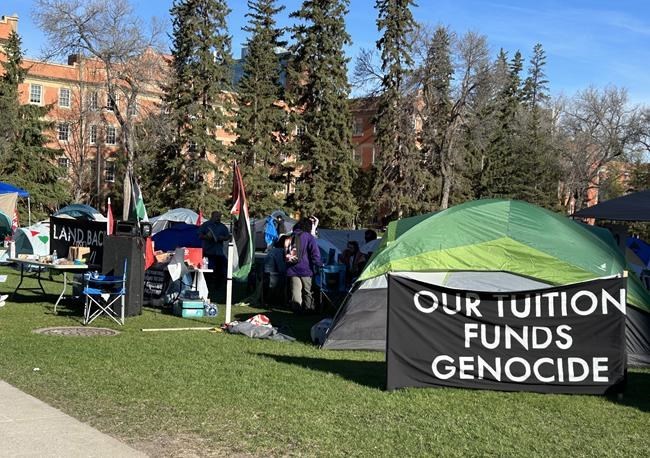Edmonton police dismantled a pro-Palestinian encampment on the University of Alberta's campus on Saturday, prompting outrage from students and academics who described the operation as violent and contested allegations that demonstrators were breaking the law.
Organizers said police fired tear gas and pepper-spray balls and wielded batons against students at the university's north campus quad shortly after arriving at 4:30 a.m., resulting in one hospitalization and several attendees placed in zip-tie handcuffs.
Videos posted to social media show a line of police members clashing with protesters in the dawn light, as young people shout "Free, free Palestine" before officers advance chanting "Move" and shoving and striking some students with billy clubs.
The footage aligns with descriptions from political science professor David Kahane, a member of the Edmonton chapter of Independent Jewish Voices Canada who was on-site with the demonstrators and called the experience "violent" and "gutting."
"I personally saw quite a heavily bleeding surface wound that came from a baton strike. I personally saw — this was after the police engagement was over — bruises from non-lethal projectiles that people were showing on their legs and arms," Kahane said in a phone interview.
"It was not peaceful."
The scene portrayed by participants stood in stark contrast to the picture painted by authorities.
Police said no tear gas was deployed, no one was hospitalized and use of force was limited.
"Our response was specifically directed at three individuals who were being aggressive with EPS members, one of whom assaulted an officer," said spokesman Scott Pattison in an email.
University president Bill Flanagan echoed police in saying "almost all of the occupants of the encampment peacefully dispersed."
In a statement Saturday, he cited fire hazards and the risk of escalation and violent clashes with counter-protesters among the reasons for the police action at the two-day-old camp.
"Of great concern, some members of the group brought in wood pallets, materials known to be used as barricade-making materials — actions that are counter to peaceful, law-abiding protests," he said.
"Overnight protests are often accompanied by serious violence and larger crowds amplify those inherent risks — especially as they attract counter-protesters or outside agitators."
Flanagan said "approved, peaceful protests are welcome" but must comply with university policies and public safety rules. "Every University of Alberta student, faculty and staff member has the right to feel secure and welcomed ... on our campuses."
About one quarter of the 50 protesters were University of Alberta students, he said.
Kahane countered that many others were alumni, organizers had already removed the handful of pallets from the site and concerns about disrupting lectures or encroaching on community members' rights were "inaccurate."
"I was one of a large group of Jews who led a Shabbat service for the whole camp yesterday evening. Students were reading, discussing being kind to one another," he said.
"It looked more like a picnic with some tents than it did like some kind of fortified encampment."
Organizers called for the resignation of the University of Alberta's president and an apology from the administration.
Following the lead of protesters on U.S. campuses, demonstrators in Canada have erected encampments at universities in Montreal, Toronto, Ottawa and Vancouver as well as Calgary, where police forcibly removed participants from campus on Thursday night. The head of the University of Calgary said the dismantling operation devolved into a clash with officers because of counter-protesters.
That incident, along with Saturday's clearance in Edmonton, prompted a group of about 500 mostly Canadian academics to call for censure of the two Alberta institutions.
"In light of the undemocratic and harmful actions taken by the University of Calgary and University of Alberta, we, the undersigned, demand an immediate academic boycott of the institution," the group said in a statement Saturday.
The professors said the boycott should remain in place until administrators rescind "legal and administrative measures" against student protesters and respond to their demands.
Protesters in Edmonton called on the university to divest from Israeli institutions, give "amnesty" to encampment participants, condemn Israel's invasion of the Gaza Strip as a "genocide" and demand that the federal government end any military contracts with the country.
The Indigenous Students' Union also decried the actions by administrators and police as "unacceptable."
The University of Alberta said no students were suspended and no community members banned in connection with the encampment, despite what some participants say they were told by an official who was on-site.
Meanwhile, McGill University has sought a court order to clear an encampment at the heart of its campus in Montreal, saying safety and security are at stake.
In a judicial application for an injunction filed Friday, the university framed its request around sanitary concerns and what it described as the "risk of violence and intimidation."
The filing cites "fierce verbal exchanges" between protesters and counter-protesters earlier this month, barrels of "human waste" on site, possible fire code breaches such as a single point of exit and the encampment's potential as a "magnet" for further clashes.
On top of a doubling of the security detail on the quad, McGill said it will likely have to spend more than $700,000 on an alternate venue for spring convocation ceremonies that are typically held on the grounds partially occupied by the protesters.
This report by The Canadian Press was first published May 11, 2024.
Christopher Reynolds, The Canadian Press




